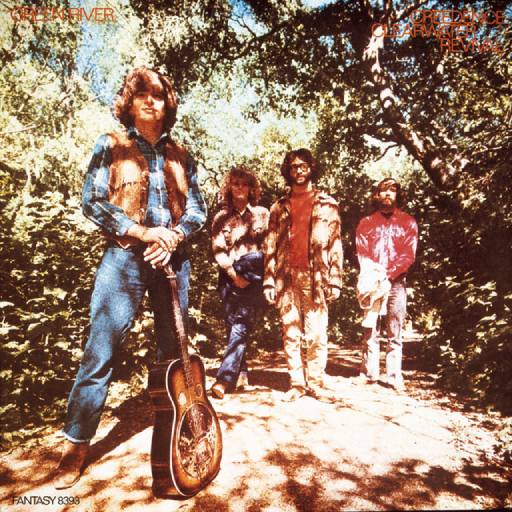Creedence Clearwater Revival, often abbreviated as CCR, is an American rock band that marked the 60s and 70s with its unique blend of rock, blues, and country. Comprised of John Fogerty, Tom Fogerty, Stu Cook, and Doug Clifford, the band hails from California. Their songs, often inspired by the landscapes and culture of the southern United States, quickly won an international audience.
Formed in 1967, Creedence Clearwater Revival swiftly took the music scene by storm with tracks like “Proud Mary” and “Bad Moon Rising”. Their self-titled debut album, released in 1968, established their distinctive sound and earned them immediate recognition. The song “Proud Mary” became iconic, notably for its catchy chorus and unforgettable guitar riff.
CCR followed up with successful albums such as “Bayou Country“, “Green River”, and “Willy and the Poor Boys”. Their ability to tell stories through their songs captivated fans worldwide. “Fortunate Son” is a perfect example of their talent for combining a catchy melody with impactful lyrics. This song, often interpreted as a critique of the Vietnam War, remains an anthem of protest.
One of the most famous anecdotes about Creedence Clearwater Revival is their performance at the Woodstock festival in 1969. Although their performance is often overshadowed by other bands, CCR delivered a powerful set that solidified their legendary status. Another famous anecdote concerns the sibling rivalry between John and Tom Fogerty, which ultimately led to the band's dissolution in 1972.
Despite their premature separation, the legacy of Creedence Clearwater Revival endures. The band was inducted into the Rock and Roll Hall of Fame in 1993, and their songs continue to influence generations of musicians. John Fogerty, in particular, has pursued a successful solo career, staying true to the spirit of CCR.
Creedence Clearwater Revival is an institution. Their music, imbued with the rebellious spirit and culture of America, continues to resonate with listeners worldwide. Revisiting their classics, one can't help but feel the power and passion that made CCR an unforgettable musical phenomenon.
The album : Green River
Released in August 1969, Creedence Clearwater Revival's “Green River” is an iconic album that has left an indelible mark on rock history. With tracks that still resonate today, this album captures the very essence of rural America and the bayou. Led by John Fogerty's powerful voice, the album seamlessly blends rock, blues, and country, creating a distinctive and timeless sound.
The recording sessions for “Green River” took place at Wally Heider Studios in San Francisco. John Fogerty, a notorious perfectionist, led the sessions with military precision, demanding the best from each band member. According to drummer Doug Clifford, “John knew exactly what he wanted. He had a clear vision for every song.” This rigor captured a raw and authentic energy, giving the album an almost live quality.
Among the standout tracks on the album, “Green River,” “Bad Moon Rising,” and “Lodi” particularly shine. “Green River,” with its catchy riff and evocative lyrics, transports the listener to the heart of the Southern swamps. “Bad Moon Rising” became an anthem with its upbeat tempo and prophetic lyrics. As for “Lodi,” it tells the story of a struggling musician, reflecting the often harsh realities of life on the road.
Upon its release, “Green River” was acclaimed by critics. Rolling Stone described the album as “a perfect blend of rock'n'roll and country.” The public's enthusiastic reception was immediate as well, propelling the album to the top of the American charts. This enthusiasm confirmed CCR as one of the most influential bands of their era.
A famous anecdote from the recording of “Green River” involves the use of a faulty amplifier. John Fogerty discovered that one of the amps produced a strange but captivating sound. Instead of replacing it, he decided to use this flaw to add a unique texture to the tracks. “It was like capturing the spirit of the bayou in an amplifier,” he explained.
“Green River” remains a cornerstone of American rock. The album, with its unforgettable melodies and evocative storytelling, continues to influence generations of musicians. Revisiting this opus, one rediscovers the power and authenticity that made Creedence Clearwater Revival rock legends.
The Song : Bad Moon Rising
Among the gems on Creedence Clearwater Revival's “Green River” album, “Bad Moon Rising” stands out with its irresistible energy and cultural impact. Released in April 1969 as a single before the album, this song quickly conquered the charts and the hearts of listeners. Composed by John Fogerty, “Bad Moon Rising” has become a timeless anthem, traversing decades with its freshness and enduring relevance.
The lyrics of “Bad Moon Rising” are both enigmatic and prophetic. John Fogerty describes apocalyptic omens, evoking natural disasters and social upheaval. The opening line, “I see a bad moon rising, I see trouble on the way,” sets the stage for a dark and unsettling vision of the future. Despite its upbeat tempo and cheerful melody, the song conveys a warning message, a striking contrast that has contributed to its lasting popularity.
“Bad Moon Rising” has inspired numerous artists over the years, leading to a multitude of notable covers. Among the most famous is the version by folk rocker Thea Gilmore, who captured the song's dark essence while adding a personal touch.
With his characteristic energy and undeniable talent on the piano, Jerry Lee Lewis revisited “Bad Moon Rising” by injecting it with a dose of rockabilly. His version retains the original structure while adding personal touches that reflect his inimitable style. The spirited piano riffs and his powerful voice breathe new life into the song, making it a version that is both dynamic and respectful of the original.
